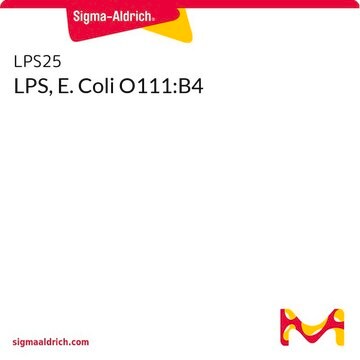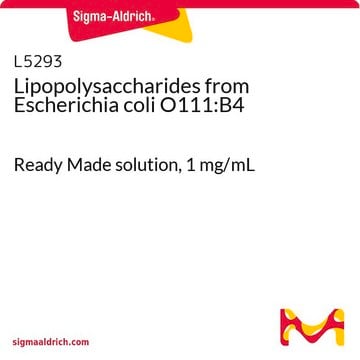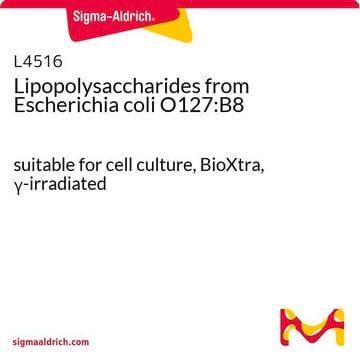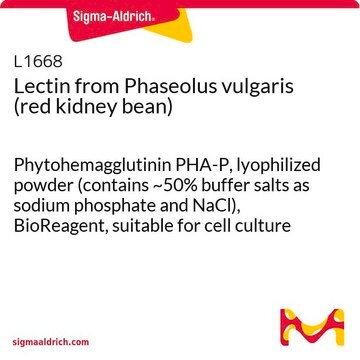437627
Lipopolysaccharide, E. coli O111: B4
from E. coli, , lyophilized, iNOS stimulator, Calbiochem®
Sinónimos:
E. coli Lipopolysaccharide, E. coli O111:B4 LPS
About This Item
Productos recomendados
product name
Lipopolysaccharide, E. coli O111: B4, Lipopolysaccharide, E. coli O111: B4 stimulates the activity of inducible nitric oxide synthase. Induces apoptosis in mouse thymus and swine lymphocytes
Quality Level
form
lyophilized
manufacturer/tradename
Calbiochem®
storage condition
OK to freeze
impurities
≤2.0% Protein
≤2.5% nucleic acid
shipped in
ambient
storage temp.
2-8°C
General description
Biochem/physiol Actions
Inducible nitric oxide synthase
Warning
Preparation Note
Reconstitution
Other Notes
Mayeux, P.R., et al. 1995. Biochem. Pharmacol. 49, 115.
Norimatsu, M., et al. 1995. Infect. Immun.63, 1122.
Feinstein, D.L., et al. 1993. J. Neurochem. 60, 1945.
Zhang, Y.H., et al. 1993. Infect. Immun.61, 5044.
Jackson, S.K., et al. 1992. Biochim. Biophys. Acta1135, 165.
O′Sullivan, M.G., et al. 1992. J. Biol. Chem.267, 14547.
Watanabe, K., et al. 1992. J. Cell. Physiol.150, 433.
Morrison, D.C., and Ryan, J.L. 1987. Annu. Rev. Med.38, 417.
Legal Information
signalword
Danger
hcodes
Hazard Classifications
Acute Tox. 2 Oral
Storage Class
6.1A - Combustible acute toxic Cat. 1 and 2 / very toxic hazardous materials
wgk_germany
WGK 3
flash_point_f
Not applicable
flash_point_c
Not applicable
Certificados de análisis (COA)
Busque Certificados de análisis (COA) introduciendo el número de lote del producto. Los números de lote se encuentran en la etiqueta del producto después de las palabras «Lot» o «Batch»
¿Ya tiene este producto?
Encuentre la documentación para los productos que ha comprado recientemente en la Biblioteca de documentos.
Los clientes también vieron
Nuestro equipo de científicos tiene experiencia en todas las áreas de investigación: Ciencias de la vida, Ciencia de los materiales, Síntesis química, Cromatografía, Analítica y muchas otras.
Póngase en contacto con el Servicio técnico





